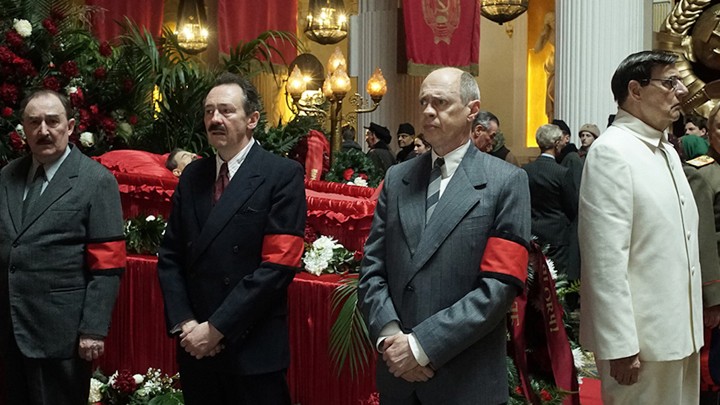What could be funnier than the death of one of the world's most evil tyrants? The Death of Stalin is billed as a comedy about politics gone mad after the demise of one of the most notorious of dictators, but I found that it is too self-conscious of the fact that it's a comedy, which for me is a death knell.
Moscow, 1953. The Man of Iron, Joseph Stalin (Adrian McLoughlin) has the population in such fear that he sends a radio station into a panic when he requests a recording of a concert that went out live and was not recorded. As a result, the harried radio producer has to quickly gather the orchestra, pull audiences out of the street and even drag another conductor out of bed to reenact the performance.
All this is going on while Lavrenti Beria (Simon Russell Beale), Stalin's head of his secret police, is rounding up and executing the newest people on Stalin's 'enemies list', a task he does not just with great methodical accomplishment but with glee.
The pianist at the concert, Maria (Olga Kuryenko), at first refuses to repeat her performance, especially for Stalin, who murdered her family. Twenty thousand rubles changes her principles, but she also leaves a note on the record telling Stalin off. He reads it and at first chuckles, then collapses.
The State and everyone at Stalin's court is so terrified of him that they won't check in on him despite hearing the thud of his collapse. It isn't until Comrade Stalin's morning tea is brought to him that he is discovered.
At this point, the Central Committee is both in panic mode and working feverishly to take over. The ineffectual nominal head, Georgy Malenkov (Jeffrey Tambor) is permanently lost, so it's up to two factions to take power. There's Beria, who is content to continue the reign of terror as is. On the other side is Nikita Khrushchev (Steve Buscemi), who would like to see a little more liberalization and a lot less firing squads.
They also have to contend with Stalin's children, the perpetually drunk and bonkers Vasily (Rupert Friend) and the hysterical Svetlana (Andrea Riseborough). As the various factions deal with everything from funeral arrangements to who takes command, a plot is hatched with Field Marshal Zhukov (Jason Isaacs), who is displeased that Beria's own squad is doing the work of the Army.
In the end, one of them stages a virtual coup and takes the reins of power.
 For a comedy, I did not laugh once in The Death of Stalin. I'd happily laugh at the death of Stalin, but not in this film about the aftermath of his death.
For a comedy, I did not laugh once in The Death of Stalin. I'd happily laugh at the death of Stalin, but not in this film about the aftermath of his death.Part of it might be that the subject is really too serious to be funny. Given his track record of killings, imprisonments and general terror, I find little humor in his life and death.
Then again, a serious subject like nuclear annihilation can be funny, but that requires a much more firm and steady hand than Armando Iannucci, who cowrote the script with David Schneider and Ian Fellows. Yes, some of Dr. Strangelove was broad, but some was grounded in reality, which is what makes it funny.
Here, everyone was playing things as though they knew it was played for laughs, as if the actors were conscious that we were 'supposed' to laugh. When a film resorts to virtual mugging for the camera, then it fails for me.
Granted, there was no actual mugging, but there was for me a very clear line from all the actors that they were asked to play things in a deliberately broad manner.
If the decision to have this group of rather repulsive men played as a collection of dolts was meant to provide the comedy, for me it failed spectacularly.
Again and again I could not shake the idea that everyone was in on the joke and treated things as a joke. "Your father is dead and your brother is shooting a gun," Khrushchev tells Svetlana when Vasily storms into the location where his father's brain is about to be removed. It isn't as if I'm not aware of what's going on, and repeating things isn't making it funny.
There isn't much in the performances to comment on because everyone is deliberately so broad. Again, I figure that was the goal but it does not make things amusing. If I were to put spin on things, I think Isaacs, Buscemi and Tambor got the best as they made the silliness of their characters clear, and Friend shows great versatility as the volatile Vasily.
Despite the deliberate hamminess of it all, I could not shake the idea that it might have been better to have made this a straight drama with some comical moments, such as Vasily's ineptness.
Maybe The Death of Stalin has a lot to say about modern politics: the crawling, the catering to whims of crazed people in charge and such. All well and good, but aren't you supposed to laugh at a comedy?
 |
| 1878-1953 |
DECISION: F

No comments:
Post a Comment
Views are always welcome, but I would ask that no vulgarity be used. Any posts that contain foul language or are bigoted in any way will not be posted.
Thank you.